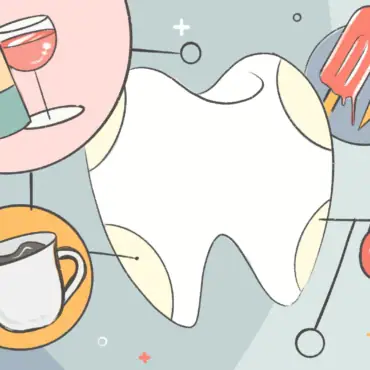At some point, most of us have to deal with tooth sensitivity. It’s not pleasant, but it can be a part of life. And while it’s a temporary nuisance for some, others have to live with it on a more permanent basis. If you tend to suffer from chronic tooth sensitivity, make sure to book a dentist appointment to find out what’s causing your pain. In the meantime, you can choose a toothpaste made for sensitive teeth.
Sensitivity can occur for lots of reasons, including gum inflammation, weakened tooth enamel, cavities, recessed gums, and so on. But no matter the source, a toothpaste for sensitive teeth can help manage the pain until the root cause of your sensitivity is treated. In fact, using the wrong toothpaste can even add further sensitivity, so it’s important to choose one suited to your issue.
Sensitivity toothpaste desensitizes the nerve endings by covering up open tubules leading to exposed nerves. Many of these pastes also contain fluoride, since fluoride toothpaste has been proven to prevent tooth decay and strengthen enamel.
Find a toothpaste for sensitive teeth
When looking for toothpaste for sensitive teeth, ask yourself how bad your symptoms are and whether you need a toothpaste that focuses entirely on sensitivity relief. If you need a super-effective sensitivity toothpaste, you may have to sacrifice other benefits like your favorite flavour or whitening ability. If you prefer using natural toothpaste, it may be difficult to find a product that offers complete protection for sensitivity, since natural brands often lack the active ingredients that offer rapid relief.
Sign up for our newsletter.
Just let us know a bit about yourself.
Just remember not all sensitivity toothpastes offer the same benefits. Some will be good at treating sensitivity, and not so good at protecting teeth against tartar or gum disease. Others are more well-rounded, offering pain relief, cavity protection, and extra fresh breath all in one. There are even teeth whitening toothpastes with sensitivity protection.
Here are some factors to keep in mind when choosing a toothpaste for sensitive teeth:
Brand: There are lots to choose from! And while it can be tempting to choose the cheapest one, it’s not always the wisest solution. Choose a brand `recommended by dentists. If you already use a toothpaste you like, try switching to a sensitive toothpaste from the same brand. When in doubt, Colgate or Sensodyne are two trusted brands for sensitivity relief. Sensodyne Extra Whitening and Sensodyne Repair also offer extra benefits like gentle whitening and cavity protection in addition to treating sensitivity. And they taste pretty good.
Due for a checkup?
Find a top rated dentist near you that takes your insurance.
ADA Seal of Approval: Many toothpaste brands boast lots of benefits, but the reality can be far from it. When a brand is genuine and true to its claims, it will have the ADA seal of approval which proves it’s effective in fighting tooth sensitivity, cavities, plaque, and other dental health issues. This seal of approval is essential to ensure the toothpaste you’re selecting will address your sensitivity effectively.
Cost: You might think toothpaste for sensitive teeth costs more than regular toothpaste, but that’s not necessarily the case. You can easily find a great product in the same price range as you would pay for any other toothpaste. Also, remember your dental health is a highly worthy investment. Prevention is always better than cure, and investing in products for excellent at-home oral health will pay off in the long run.
Ingredients: The ingredients are key to determining how effective the toothpaste will be. And two ingredients in particular are the heroes here: potassium nitrate and stannous fluoride. Potassium nitrate is the nerve-calming agent; stannous fluoride (not a Game of Thrones character) works with the enamel of your teeth to create a repairing layer on the vulnerable parts of each tooth, thereby protecting them from the piercing pain caused by sensitivity. Avoid fluoride-free toothpaste, which will not offer the same benefits.
Home remedies for sensitive teeth
A study conducted in 2013 reports 1 out of 8 people who visit the dentist do so because of sensitive teeth. While proper dental procedures are most definitely available to take care of dental sensitivity, and dental insurance can help manage the cost, there are also some useful home remedies you can try at home to combat pain from those sensitive teeth:
Oil pulling
Using coconut oil or sesame oil for something called “oil pulling” is known to reduce tooth sensitivity. A traditional Ayurvedic method that has been used in India for centuries, oil pulling involves swishing a tablespoon of oil inside your mouth for 2 to 20 minutes and then spitting it out. One study shows oil pulling daily with coconut oil can reduce the formation of plaque and also deal with the early symptoms of gingivitis, which in turn helps with tooth sensitivity. Research has shown gingivitis leads to gum recession, which happens to be one of the most common causes of tooth sensitivity.
Due for a checkup?
Find a top rated dentist near you that takes your insurance.
Garlic
For centuries, garlic has been used to cure toothaches. When you chew on a raw piece of garlic, a compound called allicin is released, which has antimicrobial properties that kill the bacteria that cause oral diseases, thereby fighting tooth sensitivity. You can make a paste using a little warm water, half a teaspoon of salt, and three cloves of garlic. Apply the paste on the area where you experience sensitivity, let it sit for a few minutes, and then wash it off with warm water mixed with salt. (And you probably want to brush your teeth for real when you’re through.)
Guava leaves
While guava itself is good for you, its leaves also have medicinal properties. They contain rutin, kaempferol, and quercetin that are all equipped with anti-inflammatory benefits for relieving tooth sensitivity. Chew on guava leaves for about three minutes (and then spit them out!) and you’ll see. You can also create a mouthwash by boiling about six guava leaves in a cup of water. Let it steep for 15 minutes and leave it to cool. Add a small amount of salt and swish after brushing.
Clove oil
Cloves numb the pain! And clove oil can boost the health of your teeth. It fights against various oral infections and has antibacterial, anesthetic, and anti-inflammatory properties. Put a drop of clove oil with either almond oil or coconut oil and use it on the affected tooth, then rinse it off with warm water.
Hydrogen peroxide
Hailed as a mild antiseptic, hydrogen peroxide can also be used as a mouth rinse to heal inflammation and take care of sensitive gums. Use about two caps of 3% hydrogen peroxide and mix with equal parts warm water, swirl the mixture in your mouth for 30 seconds, and then spit it out. Rinse your mouth immediately after so as to get rid of any remaining traces of hydrogen peroxide.
Saltwater rinse
And an old remedy many dentists recommend is a saltwater rinse, due to its antibacterial and anti-inflammatory benefits. It fights the bacteria in your mouth and boosts your overall oral hygiene. Just take about eight ounces of warm water and mix it with half a teaspoon of salt, swish it around in your mouth, spit it out. Repeat this a couple of times.
Turmeric
Known for reducing inflammation, turmeric contains a compound known as curcumin that helps relieve pain. Create a paste using dried or fresh turmeric and water, and apply to your gums to reduce tooth sensitivity and pain. You can also add half a teaspoon of salt and half a teaspoon of mustard oil to the mix and apply it to your gums twice a day.Look, no one likes having sensitive teeth, but a few steps here and there – and of course proper daily oral care – will go a long way. But most tooth sensitivity problems are largely avoidable. Just see your dentist regularly. Yes, it’s our mantra. And it’s a good one.
Due for a checkup?
Find a top rated dentist near you that takes your insurance.







